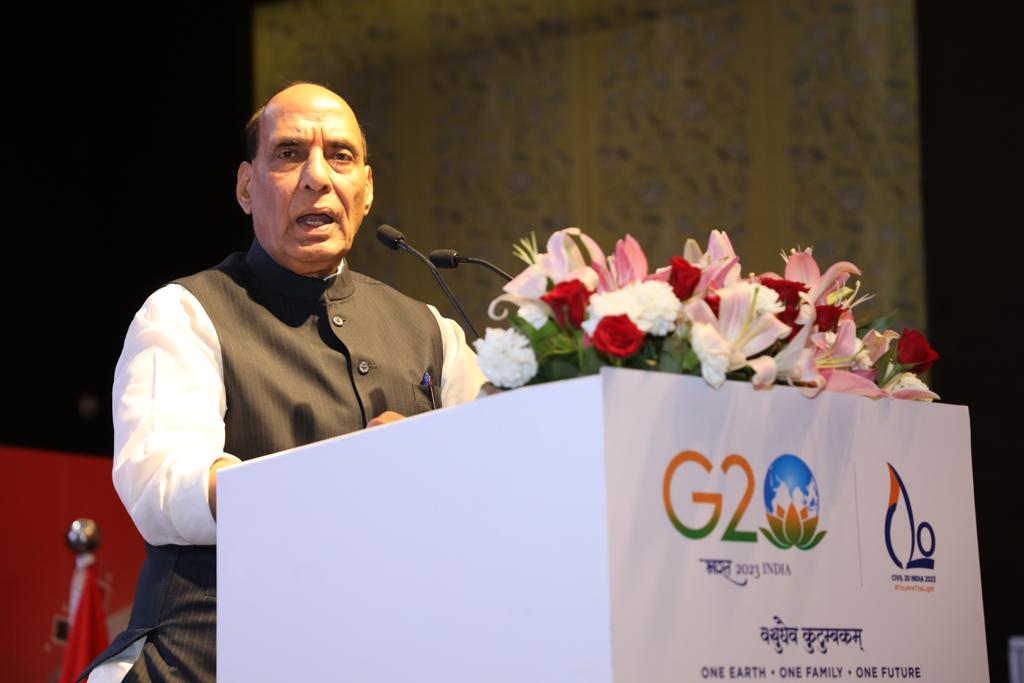
Civil Society Organisations & Governments need to work together to ensure overall progress of society: Raksha Mantri
Raksha Mantri Shri Rajnath Singh has called for enhanced synergy between Civil Society Organisations (CSOs) and Governments to ensure overall progress of society. He was addressing the Civil 20 (C20) India Summit in Jaipur, Rajasthan on July 29, 2023. The C20, launched in 2013 as an official G20 Engagement Group, provides a platform for the CSOs to bring forth non-governmental perspectives on the issues being taken up by the official G20. It gives them a forum to reflect on the primary & common concerns affecting the world and promote social & economic development.
Shri Rajnath Singh was of the view that the advantages of the CSOs and traditional Government structures need to be harnessed to achieve the goal of holistic development. “While the Government apparatus is more rigidly structured & institutionalised and the initiatives broadly represent the ideas of a substantial majority; the CSOs have fluid structures that provide a greater scope for new ideas & practices to play out in the society. In modern state structures, the governments cannot act in a hasty manner on novel & untested ideas, but the CSOs have a plenty of scope as they operate in a bottom-up approach and are more responsive towards the ever-shifting ground realities. The CSOs can act as force-multipliers for the governments,” he said.
There are various C20 groups working on diverse domains ranging from integrated holistic health, education and digital transformation, gender equality to technology, security and transparency. The Raksha Mantri emphasised that these groups have the potential to impact official policies and programmes, across all the dimensions of today’s social, economic and environmental challenges.
Shri Rajnath Singh listed out a number of examples, where both the government and civil society played a complementary role in enhancing the human well-being. “Many of the Government’s landmark initiatives such as Swachh Bharat Abhiyan, Beti Bachao Beti Padhao Abhiyan etc., which have brought significant transformational and attitudinal changes in the society, were complemented by the herculean efforts made by various CSOs in these fields. At a broader level, it can be asserted that a robust and enlightened civil society is essential for a functioning democracy, as it enables the citizens to engage in deliberative dialogues and cooperative efforts, outside the adversarial arena of electoral politics, towards achieving the national objectives,” he said.
The Raksha Mantri recalled the fact that the G20, which was formed in 1999, was upgraded to the level of Heads of State or Government in the wake of the global economic and financial crisis of 2008. He said, while its scope has significantly expanded since then to cover various areas ranging from sustainable development, health, energy, environment to anti-corruption, it still is primarily designated as the premier forum for international economic cooperation. The G20’s focus on economy encompasses economic development, improvement of quality of life, standards of living, etc.
The Raksha Mantri pointed out that while G20 is a rigidly structured forum, C20 represents numerous CSOs from across the spectrum. “The flexible, inclusive approach of C20 forum can both learn from and teach the G20, leading to further improvement in the design and implementation of policies and programmes at the global level. Thus, at the levels of C20 and G20, there exists a symbiotic relationship through which a positive feedback mechanism can be established. Hence, there is a need to nurture this relationship on a sustained basis,” he said.
Shri Rajnath Singh called for coordinated solutions to the similar and interconnected problems faced by the world. “The scale of threats we face and opportunities we have are colossal. The immensity of the tasks ahead of us requires all of us, the governments and the CSOs, G20, C20 and everyone else to work together for creating a better world,” he said.
Also touching on the theme of India’s G20 Presidency ‘Vasudhaiva Kutumbakam’, which broadly translates to ‘One Earth, One Family, One Future’, the Raksha Mantri stated that it provides an opportunity to the people across the globe to live their lives in a better way while structuring the socio-economic systems. “‘Vasudhaiva Kutumbakam’ is drawn from our ancient Sanskrit text, Maha Upanishad, and it affirms the love and respect for the entire creation around us, be it human, animal, plant, microorganisms or even inanimate matter. It shows that our ancient tradition does not conceptualise the process of ‘othering’ about which Nobel laureate Toni Morrison has written so extensively. In India, there is no ‘othering’ on the basis of race, religion, etc. We have never seen the other as different from ourselves and we have endeavoured to embrace the whole world as our own family,” he said.
C20 chair Mata Amritanandamayi, Minister of Industry, State Enterprises, Devasthan of Rajasthan Smt Shakuntla Rawat and Member of Parliament, Jaipur City Shri Ramcharan Bohra were among those present on the occasion.